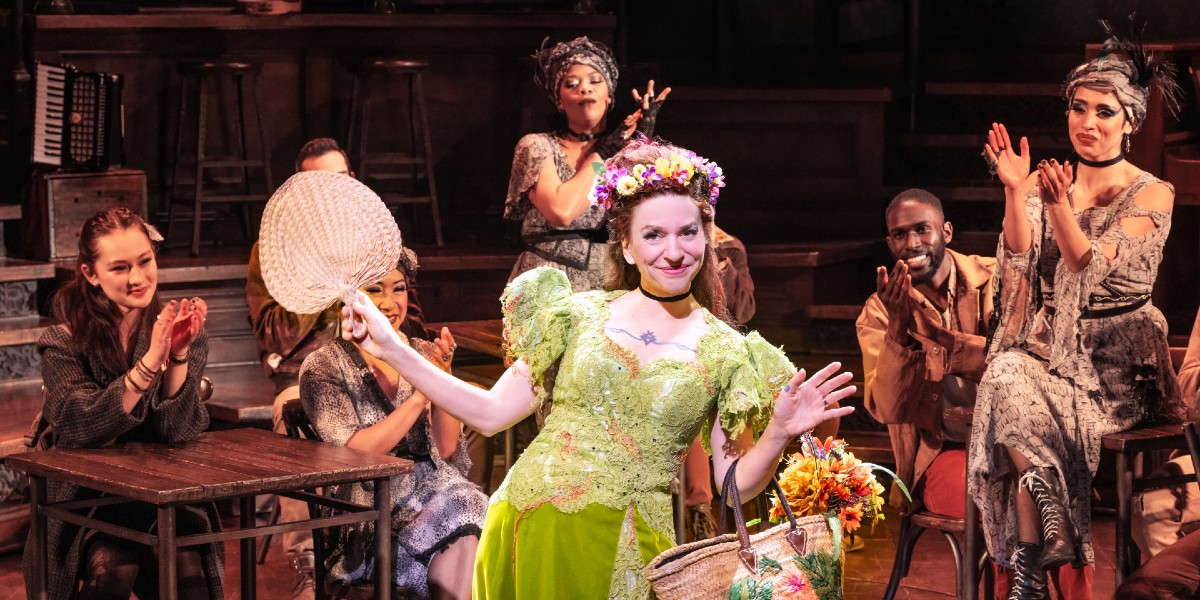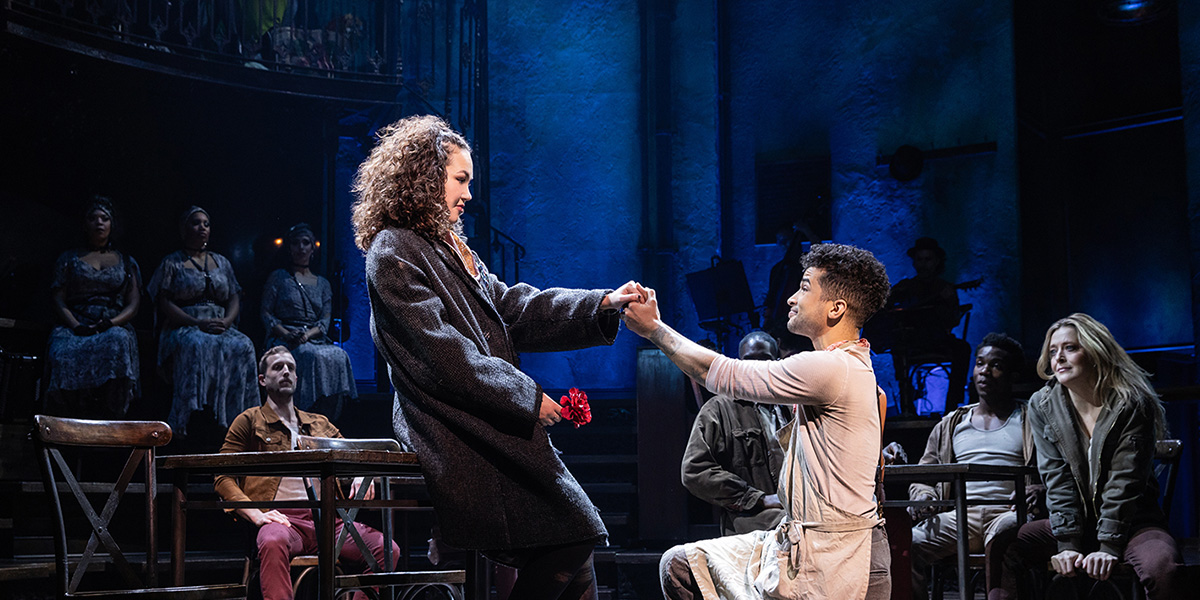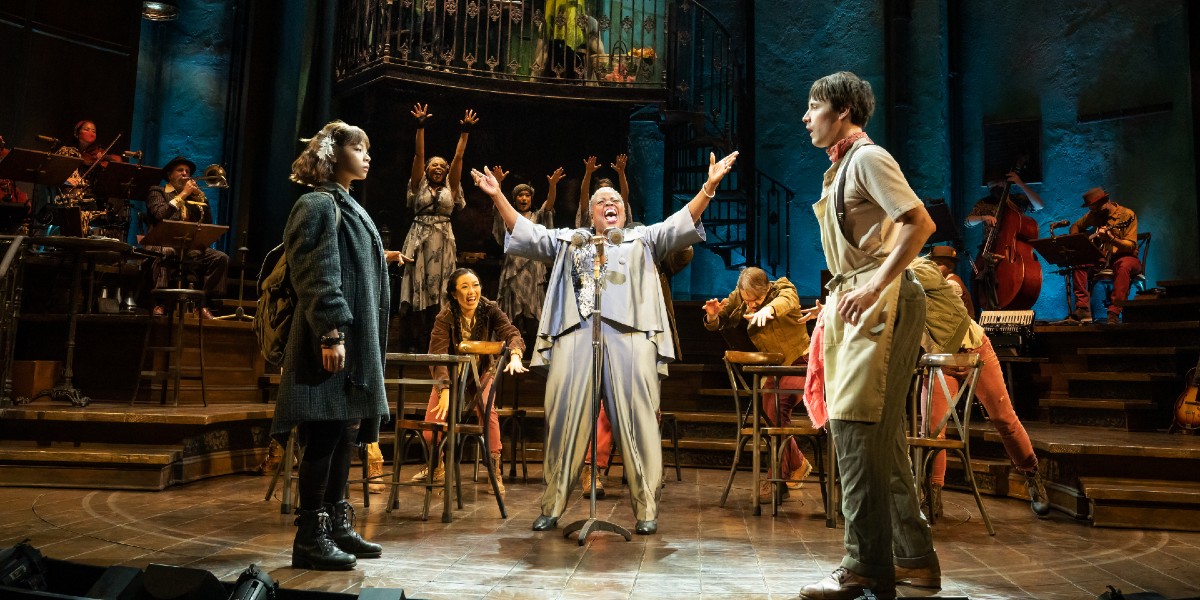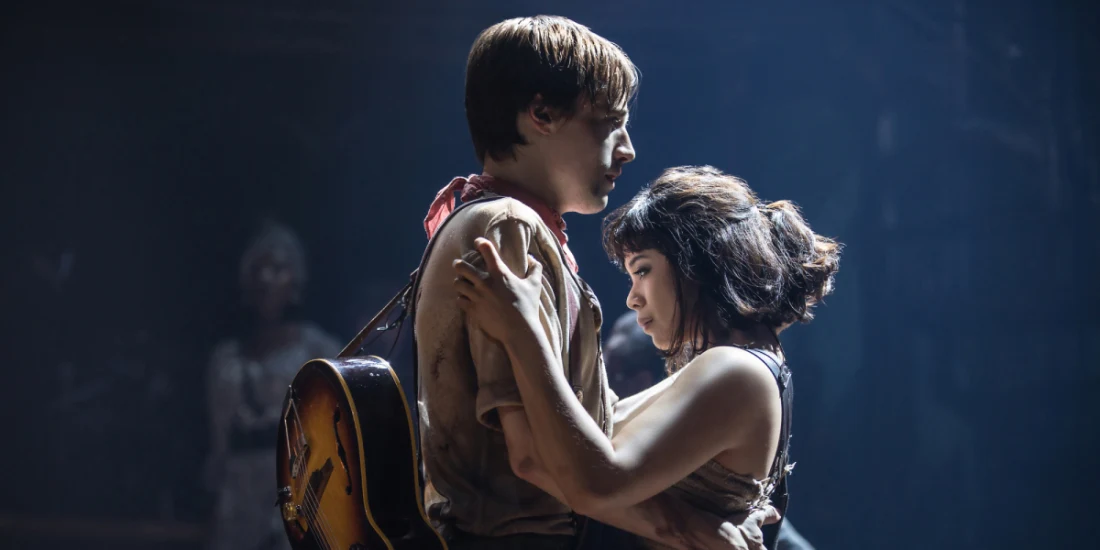All the songs in 'Hadestown' on Broadway
Go way down into Anaïs Mitchell's Tony Award-winning score for this mythic musical, which features poetic lyrics and lots of Greek mythology references.
“Did you ever wonder what it's like on the underside?” You may think you know Greek mythology, but you’ve never heard it like this. Hadestown intertwines two stories (those of Hades and Persephone and Orpheus and Eurydice) and gives them a post-apocalyptic, industrial vibe. Set in Depression-era New Orleans and showcasing a railroad to hell and an underground speakeasy, the show offers a fresh take on classic love stories.
The eight-time Tony Award-winning Best Musical originated as a concept album, so it’s no surprise that the music is a true highlight. The jazzy, folk-infused songs by Anaïs Mitchell are rich with poetic imagery and mythological references. There is so much to discover in this intricate Tony-winning score — like Hermes, you’ll want to “sing it again and again.”
Get Hadestown tickets now.
“The Road to Hell”
Hadestown opens at a bar in New Orleans. The god Hermes begins to tell a story about a railroad station on the road to hell. He introduces several other mythological figures who will play key roles: the goddess Persephone, the god Hades, and the three Fates. He also presents two humans, his ward Orpheus (“a poor boy working on a song”) and the runaway Eurydice (“a young girl looking for something to eat”).
“Any Way the Wind Blows”
Eurydice, a lonely, desperate wanderer followed by the Fates, meets Orpheus. The abandoned child of a muse, he is naïve, sincere, and frequently described with bird imagery. In Hadestown’s Off-Broadway premiere at New York Theatre Workshop, this song was the opening number instead of “Road to Hell.”
“Come Home With Me”
A lovestruck Orpheus expresses his wish to marry Eurydice. He also tells her about the song he is writing, which he hopes will “fix what's wrong, take what's broken, make it whole” — that is, bring back the quickly disappearing spring season. Eurydice is initially skeptical, but she becomes intrigued when Hermes promises Orpheus will make her “feel alive.”
“Wedding Song”
Eurydice questions Orpheus about the logistics of their potential wedding. Money is tight, so how can they afford wedding rings, food for the reception, or a marriage bed? He responds that nature will provide for them. What ultimately convinces Eurydice is hearing an excerpt of Orpheu’s song – a song so powerful it makes a flower bloom in his hand.
“Epic I”
Hermes asks Orpheus where he heard the melody that inspired the song. He actually first shared it with Orpheus; it is the tune of Hades and Persephone’s love story. Hades, the God of the underworld, fell in love with Persephone, the goddess of spring. The lovers agreed that she would spend half the year in the underworld and the other half on earth, creating the seasons. However, their relationship has hit a few bumps.

“Livin’ It Up On Top”
Persephone returns to earth and is the life of the party. Although she has arrived too late for springtime, she revels in summer's bounty. Persephone acknowledges that “the weather ain't the way it used to be,” but she does her best with her split life: “You take what you can get, and you make the most of it.”
“All I’ve Ever Known (“In spite of herself…”) [Intro]”
Eurydice falls in love with Orpheus, enthralled by his romantic ability to see the world as it could be instead of as it is. “When she fell, she fell in spite of herself,” Hermes says. He speaks most of this brief musical interlude, which introduces the following song.
“All I’ve Ever Known
In this love duet with Orpheus, Eurydice finally lets down her guard. “All I've ever known is how to hold my own, but now I wanna hold you,” she sings. Orpheus promises to stay with her forever: “The wind will never change on us.” Of course, it soon will.
“Way Down Hadestown”
Hades sends for Persephone even though six months have yet to pass. She dreads returning to the dreary Hadestown, where she self-medicates to survive. Hermes explains how everyone else who goes “way down under the ground” to Hadestown never returns to earth. This catchy production number mimics the style of a New Orleans jazz funeral in which Persephone prepares to descend to the underworld.
“A Gathering Storm”
With Persephone in Hadestown, summer ends prematurely. The crops die, and the days grow colder. “The wind is changing; there's a storm coming on,” Eurydice warns Orpheus. She focuses on what they need to do to survive: how they will eat and stay warm. Orpheus is seemingly oblivious, wholly obsessed with finishing his song.
“Epic II”
Here, we meet Hades, a cold, cruel industrial boss who mistreats his workers and hoards his wealth. But Orpheus almost seems to empathize with him, explaining that when Persephone leaves Hades, his loneliness “fuels him and feeds him and fills him with doubt” that she’ll come back. Orpheus seems to suggest this fear has caused Hades to become the taskmaster he is now, drowning out the purer song that once filled his heart.

“Chant”
Persephone finds that Hades has built factories and power grids underground in her absence. “You gotta keep your head low if you wanna keep your head,” his workers chant as they slave away in the “neon necropolis,” as an unimpressed Persephone calls it. Hades says he'll find someone else if Persephone doesn’t want his love. Meanwhile, above ground, Eurydice starves as Orpheus struggles to write.
“Hey, Little Songbird”
Hades tries to lure Eurydice to Hadestown, promising her stability and an escape from poverty. “Nobody sings on empty,” Hades says, dismissing Orpheus’s song. He implies that Orpheus can’t provide for Eurydice: “He’ll write you a poem when the power is out.”
“When the Chips are Down (Songbird vs. Rattlesnake) [Intro]”
Hades offers Eurydice a ticket to the underworld in this short musical intro. The choice is hers. Will she join him? Hermes describes Hades as a rattlesnake here. In the original myth, Eurydice dies of a snakebite; she does not choose to go to the underworld. The musical newly empowers Eurydice with the choice.
“When the Chips are Down”
“What you gonna do when the chips are down?” the Fates ask Eurydice. As she decides whether to go to Hadestown, the three sisters advise her to look out for herself: “Take if you can, give if you must — ain't nobody but yourself to trust.”
“Gone, I’m Gone”
Even though Eurydice loves Orpheus, her hunger wins, and she heads to Hadestown. “Wouldn't you have done the same in her shoes?” the Fates sing, defending her choice. “You can have your principles when you've got a belly full, but hunger has a way with you.”
“Wait for Me (“Hey, the big artiste…”) [Intro]”
Orpheus is horrified to discover where Eurydice has gone. He begs Hermes to help him get to Hadestown to bring her back. Without a railroad ticket, it will be an arduous journey, but Orpheus will do what it takes to reunite with Eurydice.

“Wait for Me”
“Wait for me! I’m coming!” Orpheus calls to Eurydice in perhaps what is Hadestown’s most famous song. Hermes guides Orpheus on the journey to the underworld, while the Fates try to undermine his confidence. In Greek mythology, Orpheus is one of the few mortal heroes who successfully journeys to the underworld while still alive.
“Why We Build the Wall”
In this call-and-response song, Hades instructs his workers to build a wall to protect them from poverty. However, the inhabitants of Hadestown seem impoverished, and they are not free; Hades owns their souls. The real reason they build this wall is to keep them in Hadestown and keep others out. Mitchell wrote this song long before the Trump presidency, but audiences have noted parallels between this song and the philosophy behind Trump’s proposed wall at the Mexico border.
“Why We Build the Wall (Behind closed doors…) [Outro]”
Act I closes with a spoken musical interlude in which Hades invites Eurydice to his office to sign her soul away to him. While Hades is occupied with Eurydice, Persephone goes onto the factory floor. The staging implies that she subtly subverts his workers, but only in small ways. It will take the arrival of Orpheus in Act II for the workers to revolt openly against Hades.
“Our Lady of the Underground”
At the top of Act II, a drunken Persephone invites the workers of Hadestown to step into her “office,” which is a speakeasy. She is the title Lady of the Underground, who sells alcohol to the workers (in contrast to the bounty she freely gave away during summer on Earth). Persephone relates to their misery and suffering; she misses life above ground, too. The only way she knows to cope is to drink herself into oblivion and party with the workers while her husband is away.
“Way Down Hadestown (Reprise)”
Now that Eurydice has signed Hades’s contract, she becomes a worker. She wonders why no one will look at or talk to her. The Fates explain, “Your place on the assembly line replaces all your memories.” A spooked Eurydice wants to go home, but by the song's end, she has already forgotten her name.
“Flowers”
Eurydice is starting to lose herself, but she still remembers a few things from her life on Earth. Trapped and alone, Eurydice beseeches her lost partner (Orpheus) to find her.

“Come Home with Me (Reprise)”
Orpheus finally manages to enter Hadestown. While Eurydice is overjoyed to see Orpheus, she knows going home with him won’t be easy. She is essentially Hades’s prisoner; she cannot leave.
“Papers (“You’re not from around here, son…”) [Intro]”
Orpheus meets Hades for the first time, and he tells Orpheus to leave. When Orpheus refuses to return alone, Hades explains that he owns Eurydice. Orpheus doesn’t want to believe this, but Eurydice confirms it’s true.
“Papers [Instrumental]”
In this wordless song, Hades instructs his workers to attack Orpheus. They brutally beat him up.
“Nothing Changes”
The workers hold a bruised and bloody Orpheus by force as the Fates sing to him. They advise him to stop fighting against the system because there is no point. Nothing changes, and Hades won’t let Eurydice go.
“If It’s True”
A disillusioned Orpheus struggles to reconcile the hopelessness of Hadestown with his previously idealistic views. His questions spark Persephone’s sympathy and inspire the workers to consider their purpose too. Orpheus supports the workers as they challenge the supposed truths of Hades’s world.
“How Long?”
Persephone implores Hades to let Orpheus and Eurydice go home together. Finally ready to face the bitter truths of Hadestown, Persephone cannot ignore the lovers' plight. “He has the kind of love for her that you and I once had,” she tells him. But Hades fears that if he gives in to Orpheus, he could lose his kingdom.
“Chant (Reprise)”
Hades realizes that the workers’ chant has changed. Thanks to Orpheus, they refute the rules of keeping their head low and turning away from each other. An unnerved Hades taunts Orpheus, mocking his song and his love for Eurydice. But Orpheus does not let Hades break his spirit. Infuriated, the God of the Underworld announces he will kill Orpheus. First, however, Orpheus will have one last chance to sing his song.
“Epic III”
Orpheus sings his (finally finished!) song, which traces Hades and Persephone’s love story. For the first time in ages, Hades opens his heart to love instead of clinging to power and wealth. By the end of Orpheus’s song, Hades and Persephone remember their earlier feelings for each other.
“Epic III (“They Danced…”) [Instrumental]”
In this instrumental reprise of “Epic III,” Hades and Persephone dance together to celebrate their rekindled love. Their dance repairs the balance of the worlds underground and above. Orpheus has “brought the world back into tune,” proclaims Hermes.
“Promises”
Orpheus and Eurydice celebrate his song and reaffirm their vows. Now that Hades has remembered the melody of his love, Eurydice believes he will let her leave with Orpheus. But that’s not necessarily true.
“Word to the Wise”
When the lovers ask Hades if they can leave, he is initially unsure how to respond. The Fates point out (via musical echoes of “Chips Are Down”) that he’ll appear weak if he lets Eurydice out of her contract, but he’ll turn her into a martyr if he refuses the request outright. The Fates recommend that Hades outwit them with a test they are sure to fail: “Give them the rope, and they'll hang themselves.”

“His Kiss, The Riot”
Hades devises a plan to seemingly let Eurydice go, but with conditions he knows Orpheus cannot fulfill: Orpheus must walk ahead of Eurydice. If he turns around to see whether she is following him, she must return to Hadestown.
“Wait for Me (“If you wanna walk out of hell…”) [Intro]”
Hermes explains Hades’s conditions to Orpheus and Eurydice. The lovers ask Hermes if this is a trick. He says it’s not a trick; it’s a test. They agree to Hades’s terms.
“Wait for Me (Reprise)”
In this reprise of “Wait for Me,” Hermes helps Orpheus and Eurydice prepare for the journey home. Meanwhile, Hades and Persephone say goodbye to each other as she gets ready to go back to Earth for springtime. They promise to work on their relationship together when she returns in the fall.
“Doubt Comes In”
Initially, Orpheus abides by his and Hades’s agreement. But, as the Fates describe, “doubt comes in.” They liken his doubt to a cold wind that blows in and makes Orpheus question himself, Eurydice, and Hades. Despite the encouragement of Eurydice and the workers, Orpheus turns around. He sees that Eurydice was behind him all along, but she descends back into Hadestown.
“Road to Hell (Reprise)”
This reprise of “Road to Hell” returns us to the beginning of the show. Once again, Hermes tells the sad story of Orpheus and Eurydice. Once again, he hopes that perhaps this time, there will be a different ending. Hermes acknowledges Orpheus as the one who taught him that hope.
“We Raise Our Cups”
At the curtain call, the company performs this final song praising “the ones who sing in the dead of night” — those like Orpheus who won’t give up hope. They toast Orpheus and say goodnight, inviting the audience to face the oft-gloomy outside world with hopefulness, too.
Get Hadestown tickets now.
Photo credit: Hadestown on Broadway. (Photos by Matthew Murphy)
Originally published on
